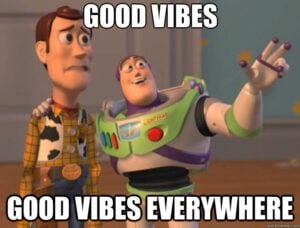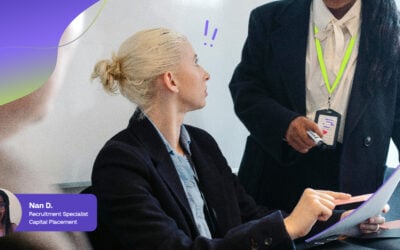
Internships serve as a bridge between education and the professional world, offering invaluable experiences for young talent to learn and grow. However, as the job market continually evolves, interns find themselves facing unique internship challenges—regardless of which industry they work in.
We’re going to delve into the insights shared by HR Managers Alix Grasso from Algorand and Staci Franklin from ICS Holding, and Founder of Underground Admins Amy Israeli, as they share their experiences in the field along with some indispensable advice for interns learning to navigate the career space.
Getting noticed in 2023 and beyond
For many recruiters, the challenge often lies in the speed of the hiring process. In today’s fast-paced job market, companies often don’t have the luxury of lengthy recruitment processes. Thus, recruiters must identify and secure top talent swiftly.
To achieve this, “sourcing” becomes a key concept in the recruiter’s toolkit. Sourcing involves actively seeking out potential candidates through various channels. While traditional methods like job boards and social media continue to play a role, recruiters also explore specialised platforms to find the right candidate. Some platforms provide insights into candidates’ skills, projects, and contributions, offering a more comprehensive view than a resume alone.
If you’re a tech candidate looking to get hired, for example, you could check out platforms like Indeed and Dice. Uploading your profile/resume online allows recruiters/potential employers to find you with ease.
Of course, there’s also LinkedIn, which is undoubtedly one of the most powerful tools during your job hunt. If you don’t have a LinkedIn profile, we recommend creating one. It puts a face to the name, shows your work experience, your interests, and if your posts are sensible, will boost their perception of your personality—without ever having met you. Once you’ve set up your profile, don’t forget to keep your LinkedIn optimised and updated.
Preparing for the first step
Entering the professional world as an intern can be a daunting prospect. Interns are often expected to master a myriad of unspoken nuances, from workplace etiquette to. It’s akin to learning a new language, one that’s not found in textbooks but in the subtleties of corporate culture. We begin at the entrypoint to the world of work—interviews.
With interviews, there’s a whole different set of things you need to learn. Some examples include how to sell yourself, how to structure your answers, how to dress, how to use body language, and so on. But preparation can take you a long way.

For Staci, an experienced recruiter, proactive preparation for interviews is the way to go. She notes, “They will have to learn how to present themselves at an interview, how to answer questions, how to make eye contact, not too little, not too much, shaking hands, so on and so forth.”
To do this consistently and naturally throughout an interview requires practice in advance but it’s not that difficult, we promise. If you’ve ever caught yourself practising your “professional smile” in front of the mirror, congratulations! Staring at your reflection as you work on your body language counts as interview preparation.
Aside from the traditional methods, there are some less common yet highly recommended ways to prepare for an interview. Did you know that it’s perfectly acceptable to reach out to a recruiter from a company you’ve applied to and talk to them about the interview beforehand?
Recruiters like Staci are more than willing to assist candidates prior to an interview, ensuring they have a better understanding of what to expect before walking in. “I’ve had candidates say, ‘Hey, what can I expect from the interview? Is there anything you can tell me to help me nail this interview?’ And absolutely, I’d help them out.”
Here’s where the power of communication cannot be overstated. Asking questions about what to expect, dress code, and any specific industry knowledge to brush up on can help demystify the interview process and boost your confidence. This proactive approach can help interns build their confidence and readiness for interviews.
But it’s also crucial to remember that interview preparedness alone is not sufficient to ensure you get the internship and a successful career path. Ideally, your internship journey should be a blend of confidence-building, networking, and skill development— both technical and soft skills.
The internet is a treasure trove of resources, offering numerous tips, articles, and videos on mastering soft skills like communication, teamwork, and problem-solving. Furthermore, participating in workshops, webinars, or online courses relevant to your field can make you a more attractive candidate.
Internal alignment
We mentioned that developing both hard and soft skills is important. The reason why is that the process of evaluating candidates transcends the mere examination of technical skills. It delves into the realm of assessing qualities that are often harder to quantify but equally, if not more, important. Alix, in her role as a recruiter, emphasises the significance of internal alignment during the hiring process.
On internal alignment, Riaz and Linda Khadem, for Entrepreneur, wrote, “Internal alignment is just as important and includes the alignment of people in an organisation to work efficiently and collaboratively to fulfil the purpose of the company.”
Everyone from the hiring team, including the hiring manager and interview panel, share a unified understanding of the role and its requirements going in. Through meetings and discussions, recruiters like Alix strive to create a holistic view of the ideal candidate, encompassing both technical competencies and cultural fit.
“I come in with a pretty strict process for hiring where I have a meeting with the hiring manager and then we decide who’s going to be a part of the interview team. Then I make them all sit in a meeting and I make the hiring manager tell them about the role, what’s important to them about the role, and why these people are part of this team that’s going to hire the role. After this, we assign them interview roles, then we break, and then you go to the interviews and finally, we recap,” Alix explained.
For Alix, driving alignment on a hire is of utmost importance. “I think, especially for junior candidates, when things seem like they’re going really well and you go really far and then something doesn’t come to fruition, it’s so easy to take it personally. But I bet 90% of the time, it’s misalignment internally … hiring is pretty complicated and complex these days.”
With regard to misalignment, Riaz and Linda highlight in their piece,“As the organisation grows larger, so does the challenge of misalignment, overt or covert. Misalignment slows the progress of the organisation and disempowers the committed team, while promoting the personal agendas of individuals. Many entrepreneurial organisations fail during scale-up.”
Interns can glean several lessons from this perspective. When preparing for interviews, it’s essential to consider the multifaceted nature of the evaluation process. Beyond showcasing technical skills, candidates should aim to demonstrate adaptability, collaboration, and cultural fit. These qualities are best illustrated through concrete examples from internships, projects, or extracurricular activities. Stories that highlight your problem-solving abilities, teamwork, and alignment with a company’s values can significantly enhance your candidacy.
Cultural fit vs. skills
The quest for the ideal candidate often leads to a debate on the balance between cultural fit and technical expertise. But many companies value candidates who not only possess the requisite skills but can also seamlessly integrate into the existing culture.
Different teams may require different personalities, and finding the right fit is crucial for long-term success. Showcasing cultural fit during the interview process could reward you as it helps interviewers place you in the team and visualise you being a part of it. You could call it a vibe check.

However, as Amy Israeli astutely observes, homogeneity in a team can be counterproductive. Diverse teams bring together individuals with varying perspectives, ideas, and problem-solving approaches. This diversity can lead to more innovative solutions and enhanced creativity. Thus, the emphasis should be on finding candidates who, while culturally aligned, also contribute to the team’s diversity of thought.
“In my opinion, you should have cultural diversity on your team. You should have those quiet people and those loud people, from all kinds of different backgrounds. Everything and everyone should be working together, communicating and collaborating. It shouldn’t be, ‘We’re all this one type of person’,” Amy explained.
“I see a lot of problems with teams who are all one person cloned over and over again. So, I would say, as an intern, the biggest thing you can do is show interest in the company and the role and what you would be learning. Go forward from there rather than focusing on the culture fit, because that’s a hard thing to pin down,” she added.
So, during interviews, candidates should strive to strike a balance between professionalism and authenticity. Authenticity ensures that your true self shines through, enabling interviewers to assess whether you align with the company’s culture naturally.
Remember that culture isn’t static—it evolves. To exhibit cultural fit, conduct thorough research on the company’s values, mission, and work environment. Tailor your responses to demonstrate how your personal values and experiences align with the organisation’s culture. Additionally, consider the team dynamics and personalities you may be working with and adapt your interview approach accordingly.
Final thoughts
Today, internships remain an indispensable vehicle for learning, growth, and preparation for a bright future in the professional world. From mastering the art of interviewing to striking the balance between technical skills and cultural fit, the journey from student to professional is a dynamic one.
However, armed with knowledge, preparation, and a proactive mindset, you can overcome these internship challenges and forge successful careers. Your experiences not only shape your personal growth but also contribute to the ever-evolving tapestry of industries you enter.
Embrace a proactive and adaptable approach. Through effective communication, preparation, and a genuine passion for your chosen field, no challenge is too hard to overcome!



